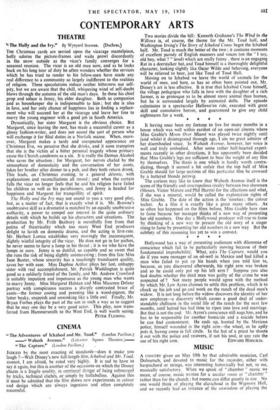CINEMA
" The Adventures of Ichabod and Mr. Toad." (London Pavilion.) Wabash Avenue." (Leicester Square Threatre.) " The Capture." (London Pavilion.) JUDGED by the most exacting of standards—does it make you laugh ?—Walt Disney's new full-length film, Ichabod and Mr. Toad, cannot, I am afraid, be rated very highly. It is sad to have to say it again, but this is another of the occasions on which the Disney charm is a fragile quality, in continual danger of being submerged by tricks, technical clichés, or simply by hullabaloo. Against this it must be admitted that the film shows new experiments in colour and design which are always ingenious and often completely successful. Two stories divide the bill: Kenneth Grahame's The Wind in the Willows is, of course, the theme for the Mr. Toad half, and Washington Irving's The Story of Ichabod Crane begot the Ichabod half. Mr. Toad is much the better of the two ; it contains moments of excellent parody of English manners and voices (on the " I say, old boy, what ? " level) which are really funny there is an engaging Rat in a deerstalker hat, and Toad himself is a thoroughly delightful character, looking slightly like Oscar Wilde and behaving, everyone will be relieved to hear, just like Toad of Toad Hall.
Moving on to Ichabod we leave the world of animals for the world of men, and here, as has so often been pointed out, Mr. Disney's art is less effective. It is true that Ichabod Crane himself, the village pedagogue who falls in love with the daughter of a rich farmer, is so grotesque as to be almost more animal than human, but he is surrounded largely by animated dolls. The episode culminates in a spectacular Hallowe'en ride, executed with great skill and cumulative horror, and guaranteed to give any child nightmares for a week. * * * *
It having once been my fortune to live for many months in a house which was well within earshot of an open-air cinema where Miss Grable's Moon Over Miami was played twice nightly until (and while) it disintegrated through age, I am no great admirer of her disembodied voice. In Wabash Avenue. however, her voice is well and truly embodied. After some rather half-hearted experi- ments recently in other directions, it has apparently been decided that Miss Grable's legs are sufficient to bear the weight of any film by themselves. The thesis is one which is hardly worth contra- dicting, though it seemed a bit unfair that the top half of Miss Grable should for large sections of this particular film be crowned by a battered blonde periwig.
The curious may like to know that Wabash Avenue itself is the scene of the friendly and unscrupulous rivalry between two showmen (Messrs. Victor Mature and Phil Harris) for the affections and what, if she was a mineral, would be called the exploitation rights of Miss Grable. The date of the action is the 'nineties ; the colour techni. As a film it is exactly like a great many others. As so often has happened on the films before, Miss Grable here rises to fame because her manager thinks of a new way of presenting her old numbers. One day a Hollywood producer will rise to fame by thinking of a new way to present the old story of a singer rising to fame by presenting her old numbers in a new way But the subtlety of this reasoning has yet to win a convei t.
* * * *
Hollywood has a way of presenting audiences with dilemmas of conscience which fail to be particularly moving because of their fundamental improbability. What, asks The Capture, would you do if you were manager of an oil-well in Mexico and had killed a man who failed to put up his hands when you told him to, because, as you discovered afterwards, his right arm was broken and so he could only put up his left arm ? Suppose you also had doubts whether the dead man was guilty of the crime he was suspected of ? Not many people would agree with the method by which Mr. Lew Ayres chooses to settle this problem, which is to chuck up his job and go and work on the ranch of the dead man's widow. It is not long before the widow discovers the identity of her new employee—a discovery which causes a good deal of under- standable chilliness in the social life of the ranch for the next few months, until hatred has had time to ripen into love and marriage. But that is not the end. Mr. Ayres's conscience still nags him, and he has to be responsible for another homicide and a suicide before he can find contentment. He ends up, hunted by the Mexican police, himself wounded in the right arm—the wheel, as he aptly puts it, having come in full circle. In the but of a priest he shoots it out with the police and recovers, if not his soul, at any rate the










































 Previous page
Previous page